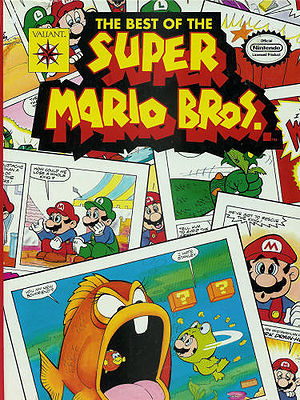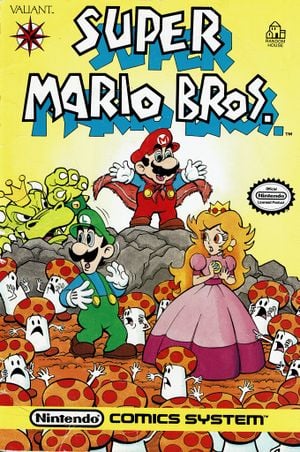Nintendo Comics System: Difference between revisions
SethAllen623 (talk | contribs) |
SethAllen623 (talk | contribs) m (→Creative team) |
||
| Line 18: | Line 18: | ||
==Creative team== | ==Creative team== | ||
The ''Nintendo Comics System'' had a highly variable stable of | The ''Nintendo Comics System'' had a highly variable stable of writers and artists, leading to a somewhat inconsistent visual style. Some of the recurring writers and artists included Janet Jackson, Ken Lopez, Mark McClellan, Art Nichols, {{wp|Bill Valely}}, John Walker, and P. Zorito. | ||
==Publication History== | ==Publication History== | ||
Revision as of 13:49, December 31, 2023
This article is under construction. Therefore, please excuse its informal appearance while it is being worked on. We hope to have it completed as soon as possible.
It has been suggested that this page be moved to Super Mario Bros. (Valiant Comics). (discuss)
Template:Quote2 The Nintendo Comics System is the umbrella brand for Valiant Comics's line of licensed comics based on Nintendo properties. Running from 1990 to 1991, the comics include stories based on Super Mario, The Legend of Zelda (with some inspirations from the cartoon), Punch-Out!!, Metroid (one story), and Captain N. Issues could feature comics based on multiple properties or focus on a single one. Of the properties featured, Super Mario was the most prolific and longest-running.
Distinct from the regular Super Mario stories is the 4-issues Game Boy miniseries, focusing exclusively on Super Mario Land.
Overview
The premise of the Super Mario Bros. comics, set up by the introductory story "The Legend", follows the basic plot of Super Mario Bros.: the peaceful Mushroom Kingdom is invaded by the evil forces of Bowser. Hearing the inhabitant's cries for help, two plumbers named Mario and Luigi set out to adventure, defeating Bowser and restoring the kidnapped Mushroom King and Princess Toadstool to the throne. Hailed as heroes by the Mushroom Kingdom's denizens, Mario and Luigi decide to stay behind as its protectors, knowing Bowser won't take his defeat lying down.
From that point on, the comics had no overarching storyline. The stories featured Mario, Luigi, Toadstool and Toad foiling plots by Bowser and other villains to conquer the kingdom (often involving kidnapping the scatterbrained and moronic Mushroom King or the Princess), and sometimes getting into hijinks during their downtime. Stories were comedic and absurd in natures, with plots such as Bowser developing a bomb that makes all those who inhaled its fumes lethally stupid, or Toadstool participating in a bowling ball tournament played with oversized meatballs. Primarily drawing on the settings and characters of the platformers up to 'Super Mario Bros. 3, the comic's cast was rounded by a number of original characters including the Mushroom King's beleaguered advisor Wooster, the neurotic lovestruck Stanley the Talking Fish, and Mario's superhero idol Dirk Drain-Head.
A trademark of the Nintendo Comics Systems line was breaking up the stories with one-off pages. These often featured visual humour and insight about the comic's characters.
Creative team
The Nintendo Comics System had a highly variable stable of writers and artists, leading to a somewhat inconsistent visual style. Some of the recurring writers and artists included Janet Jackson, Ken Lopez, Mark McClellan, Art Nichols, Bill Valely, John Walker, and P. Zorito.
Publication History
According to an info page in Nintendo Comics System 01, Valiant's deal with Nintendo was announced at a January 1989 conference in New York. Artists drew the story "The Fish That Should've Gotten Away" live for the press, making it the first comic produced for the line.
In January 1990, an 8-pages Sneak Preview featuring various pages from the upcoming comics and ultimately unused art was published. This was the first comic issue published by Valiant, predating the company's wrestling and self-owned superhero titles.
Below is a comprehensive list of Super Mario-related titles, including the Captain N comics that include Donkey Kong (an occasional antagonist in the series).
Heavy stock
Released in 1990.
Nintendo Comics System
These books contain comics from various systems.
Nintendo Comics System No. 1
- The Legend
- Just Deserts
- Welcome to Videoland (Captain N comic with Donkey Kong cameo)
- All's Well That Ends Swell (Captain N comic with Donkey Kong cameo)
- The Fish That Should've Gotten Away
- Public Service Announcement
- The Mario Bros. Guide to Grooming Your Moustache
- Outsiders (Punch-Out!! comic with Mario cameo)
- The Adventures of Dirk Drain-Head
- You Again?
Nintendo Comics System No. 2
- The Legend
- Betrayal Most Proper
- Welcome to Videoland
Super Mario Bros.
Super Mario Bros. Special Edition #1
- The Legend
- Mutiny on the Fungi
- Dear Princess Toadstool
- Koopa's Health and Beauty Tips
- A Mouser in the Houser
Super Mario Bros. #1
Super Mario Bros. #2
- Magic Carpet Madness
- Dear Princess Toadstool
- Mario Bros. Museum of Plumbing
- The Kingdom Enquirer
- Koopa's High School Yearbook
Super Mario Bros. #3
- Bedtime for Drain-Head
- Fryguy High Yearbook -- Activity Page!
- Mario Bros. Museum of Plumbing
- Love Flounders
- Family Album "The Early Years"
Super Mario Bros. #4
- Beauty and the Beach
- Koopa-Kola
- In the Swim! Fun and Sun Fashions
- Get Koop-ed Up With the Nicest People
- Fins and Roses
- Koopatone
Captain N: The Game Master
Captain N: The Game Master No. 1
- Welcome to Videoland
Captain N: The Game Master No. 3
- Video-Town
Captain N: The Game Master No. 4
- Secrets of the Warp Zones
Game Boy
- Game Boy #1: In the Palm of Your Hand..., Parts I and II
- Game Boy #2: It's a Small World After All, Parts I and II
- Game Boy #3: Team Play, Parts I and II
- Game Boy #4: Pipes is Pipes
Soft cover
Released in 1991.
Super Mario Bros.
Super Mario Bros. Feb No. 1
Super Mario Bros. May No. 4
Adventures of Super Mario Bros.
Adventures of the Super Mario Bros. Feb. No. 1
- It's Always Fair Weather
- Family Album "The Early Years"
- Welcome to Videoland
Adventures of the Super Mario Bros. May No. 4
Adventures of the Super Mario Bros. Jun No. 5
Adventures of the Super Mario Bros. Jul No. 6
Adventures of the Super Mario Bros. Aug No. 7
Adventures of the Super Mario Bros. Sep No. 8
Adventures of the Super Mario Bros. Oct No. 9
- Bowser Knows Best
- Secrets of the Warp Zones
Nintendo Comics System Featuring...
Nintendo Comics System featuring Super Mario Bros. Jul No. 6
Nintendo Comics System featuring Super Mario Bros. Sep No. 8
Nintendo Comics System featuring Super Mario Bros. Oct. No. 9
Hardcover collections
The Best of the Nintendo Comics System
- In the Palm of Your Hand...
- It's a Small World After All
- Welcome to Videoland
- All's Well That Ends Swell
- Video-Town
- Outsiders
The Best of Super Mario Bros.
- The Legend
- Just Deserts
- Piranha-Round Sue
- Koopa's Believe It or Else!
- Dear Princess Toadstool x2
- Magic Carpet Madness
- The Adventures of Dirk Drain-Head
- Throne Out
- Mario Bros. Museum of Plumbing x2
- The Kingdom Enquirer
- The Fish That Should've Gotten Away
- Cloud Burst
- Love Flounders
- FryGuy High Yearbook - Activity Page!
- Family Album "Summer Camp" (new)
- Duh Stoopid Bomb! (new)
- Kitchen Kraziness
- Public Service Announcement
- Beauty and the Beach
- Koopa-Kola
- Get Koop-ed Up With the Nicest People
- Fins and Roses
- In the Swim! Fun and Sun Fashions
- Koopatone
- Bedtime for Drain-Head
- Koopa's High School Yearbook
- Cloud Nine
- Betrayal Most Proper
- The Mario Bros. Guide to Grooming Your Moustache
- The Buddy System
- It's Always Fair Weather
- Weight Up
- Family Album "The Early Years"
Valiant Illustrated Action Books
The Super Mario Bros. Meet the Koopa Kids
- Bowser Knows Best
- The Buddy System
- Kitchen Kraziness
- Throne Out
- Fins and Roses
- Get Koop-ed Up With the Nicest People
- Weight Up
- The Revenge of Pipe Ooze!
- The Mario Bros. Museum of Plumbing
The Super Mario Bros. Battle Against Bowser
- Magic Carpet Madness
- Koopa's High School Yearbook
- Koopa's Believe It or Else!
- Beauty and the Beach
- Koopa-Kola
- Koopatone
- Cloud Burst
- Duh Stoopid Bomb!
- The Mario Bros. Museum of Plumbing
The Super Mario Bros. in: "Mario's Special Powers"
- The Legend
- It's Always Fair Weather
- Love Flounders
- Family Album "The Early Years"
- Family Album "Summer Camp"
- Bedtime for Drain-Head
- Tanooki Suits Me (new, exclusive)
Super Mario in: "Tatanga Invades Earth"
- In the Palm of Your Hand..., Parts I and II
- It's a Small World After All, Parts I and II

